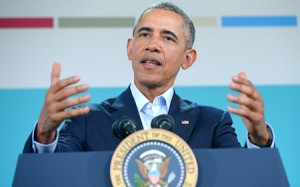Los Angeles Times
Doyle McManus
 President Barack Obama is pursuing two different strategies in two halves of Syria. One is working; the other is not. He’s making progress in eastern Syria, where the United States is leading an expanding military campaign against Daesh (the self-proclaimed Islamic State of Iraq and the Levant).
President Barack Obama is pursuing two different strategies in two halves of Syria. One is working; the other is not. He’s making progress in eastern Syria, where the United States is leading an expanding military campaign against Daesh (the self-proclaimed Islamic State of Iraq and the Levant).
American air strikes and efforts on the ground have taken a visible toll on the terrorist group. Its territory has shrunk, its finances are a mess, its recruitment numbers are down. US Special Forces are training Syrian rebels with the aim of capturing Daesh’s capital of Raqqa — maybe even before Obama leaves office.
Last week, after years of resisting intervention in Syria’s civil war, Obama announced that he’s sending an additional 250 US troops to eastern Syria, on top of 50 who arrived last year.
His rationale: These troops are part of the campaign against Daesh, a direct threat to the US, not the civil war against Syrian President Bashar Al Assad. Officially, those 300 US troops aren’t on a combat mission; they’re coordinating local forces, collecting intelligence and finding targets for air strikes. But they include special operations teams capable of killing or capturing Daesh leaders — and some have already done so.
In western Syria, the more populous half of the country, it’s a different story. Since 2011, the president has been saying that Al Assad must cede power to a transition government including the rebels who are fighting to overthrow him. Relying on diplomacy rather than force, US Secretary of State John Kerry has worked doggedly to cajole the warring factions into a ceasefire and open peace negotiations.
For a while, it looked as if Kerry had succeeded. In February, Al Assad agreed to a “cessation of hostilities”, and for almost two months many Syrians enjoyed a respite from war.
But each time peace talks got underway in Geneva, Al Assad’s forces launched attacks on civilian areas — prompting opposition delegates to walk out in protest, as Al Assad knew they would. Some rebel units violated the truce as well, but on a smaller scale. Naturally, each side blamed the other for the breakdowns. Kerry expected Russia, Al Assad’s most important ally, to help enforce the ceasefires and keep the negotiations on track. That didn’t happen; instead, Russia continued its air strikes in Syria — in some cases, attacking rebel units trained and equipped by the CIA.
Last week, Al Assad’s air force bombed rebel positions and civilian targets including two hospitals in Syria’s largest city, Aleppo. His army is surrounding the city, the last major urban area held partly by rebel forces. If Al Assad takes Aleppo, the war in western Syria will largely be over, and the government will have won. (A partial ceasefire was announced on Friday, but it covers only two small areas, and doesn’t include Aleppo.)
So what’s Plan B? Officially, there isn’t one. Obama has rejected every alternative he’s been presented. “The problem with any Plan B that does not involve a political settlement is that it means more fighting, potentially for years,” he said last month.
That’s true. But it’s also a straw man; the whole point of a Plan B would be to increase pressure on Al Assad to agree to a political settlement. Here’s one version of that kind of Plan B, long discussed by US and Arab officials: Supply Syrian rebels with anti-aircraft missiles, so they can defend themselves against air strikes.
That raises the danger that a portable anti-aircraft missile could fall into the hands of a terrorist group. So intelligence agencies have discussed installing devices that would disable the missiles if they were taken out of a designated area.
And there are other options between passivity and a ground invasion: more weapons, increased training and intelligence-sharing, a “safe zone” for refugees.
Syria’s two wars are very different from each other. A strategy that makes sense in one half of the country may not in the other.
Still, it’s worth noticing that in eastern Syria, Obama has found a way to put US troops on the ground without stepping on the slippery slope he has always feared.
He has made it clear that there won’t be a US invasion or occupation — even though the enemy, Daesh, is considered a direct threat.
In western Syria, Obama has long claimed he has only two choices: either minimal involvement or a full-scale ground invasion. His experience in eastern Syria, where his “light footprint” strategy is showing results, refutes that argument. Diplomacy without force isn’t helping Obama achieve his goal of a political settlement; that dream is slipping away even as Syrian civilians are being massacred. It’s time for Obama to choose a Plan B — whether he likes it or not.



